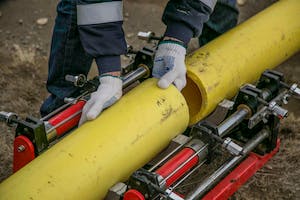What does a plumber do?
by siteadmin

Plumbers are responsible to install, maintain, and repair pipes, valves, and fixtures in homes, businesses, and other places. They may also be required to work on industrial equipment, such as power plants, factories, or HVAC systems.
Plumbers need to be able understand plumbing issues and communicate these clearly with clients. They may also need to be able to read blueprints and other building specifications to ensure the job is done correctly.
Installation
Plumbers install pipes for water distribution, gas distribution, and waste disposal in homes and businesses. They may also be responsible to install fixtures in bathrooms and kitchens.
Many people work as construction laborers, plumbers, and maintenance personnel. Some are self-employed or sole proprietors.
Although it is a huge responsibility, it can also be rewarding if your project is completed on time and within budget. Make sure you have the right license and insurance when hiring a plumber.
They can be trained on the job or through an apprenticeship program which combines classroom instruction with paid on-thejob experience. They should have a good understanding of local codes and regulations. They also need to be able to work long hours and have the confidence to deal effectively with clients. They are able to identify potential problems before they become major issues, and they also have a good understanding of modern technology.
Maintenance
There are many tasks that a plumber must complete when they are hired. They install and repair pipes that transport water or gas between homes, businesses, and factories. Additionally, plumbers maintain plumbing fixtures, appliances, and heating systems such as dishwashers, washing machines, and heating units.
They might also be called upon to repair or assess plumbing problems in a home's water supply system. These situations can be avoided by their skill and will reduce property damage and potential health risks.
Plumbers are highly regulated. Most states require them to be licensed and insure. They must also have experience and continue to learn in order to keep up with industry developments.
Repair
If you have any plumbing issues at home, hiring a plumber is the best solution. He will come to your home to fix or replace pipes or equipment, and also help with issues such as leaky drains or faucets.
They will not only fix the immediate problem but also suggest ways to prevent it happening again. This will save you both time as well as money over the long-term.
Plumbers are always equipped with the latest tools and equipment to ensure they do a great job the first time. They are also able to explain what they do so that you can ask questions confidently and gain insight into the reasons for doing things a certain way.
They are also up-to-date on the latest plumbing codes and standards. This makes them valuable assets for home inspections and potential sales.
Troubleshooting
Troubleshooting refers to the diagnosis and repair of malfunctioning equipment or systems. It uses a variety of techniques to determine the cause of the problem and restore an application or piece of equipment to its original operational state.
Gathering information is the first step to troubleshooting any issue. This information includes symptoms, how it occurred, and any special circumstances that may be required for resolution.
Next, a technician might check the hardware connectivity and any related symptoms. For assistance, they could also consult the documentation or search a knowledge base.
Split-half is the most popular troubleshooting method. This involves a technician testing half of the system at once to find the problem. Once the first half of the system is tested, they can move on to the second half. This test usually takes less time and gives greater assurance that the issue is fixed.
Plumbers are responsible to install, maintain, and repair pipes, valves, and fixtures in homes, businesses, and other places. They may also be required to work on industrial equipment, such as power plants, factories, or HVAC systems. Plumbers need to be able understand plumbing issues and communicate these clearly with clients. They may also need to…
Recent Posts
- Next Day Potty Revolutionizes Event Planning with Premium Portable Restroom Trailer Rentals
- Next Day Potty Revolutionizes Event Planning with Premium Portable Restroom Trailer Rentals
- Expert Phoenix Palm Tree Trimming Services
- Leading the Way in Air Conditioning Services in Provo, UT
- Your Trusted Partner for Pest Control in Abbotsford, BC
